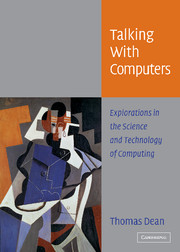Book contents
- Frontmatter
- Contents
- Preface
- Acknowledgments
- 1 TALKING WITH COMPUTERS
- 2 THE SHELL GAME
- 3 KEEPING TRACK OF YOUR STUFF
- 4 DON'T SWEAT THE SYNTAX
- 5 COMPUTATIONAL MUDDLES
- 6 GETTING ORIENTED
- 7 THANKS FOR SHARING
- 8 YOU'VE GOT (JUNK) EMAIL
- 9 MODERN ARCHITECTURE
- 10 DO ROBOTS SLEEP?
- 11 UNDER THE HOOD
- 12 ANALYZE THIS
- 13 FOREST FOR THE TREES
- 14 SEARCHING THE WILD WEB
- 15 DARWIN'S DANGEROUS ALGORITHM
- 16 AIN'T NOBODY HERE BUT US MACHINES
- Bibliography
- Index
8 - YOU'VE GOT (JUNK) EMAIL
Published online by Cambridge University Press: 05 June 2012
- Frontmatter
- Contents
- Preface
- Acknowledgments
- 1 TALKING WITH COMPUTERS
- 2 THE SHELL GAME
- 3 KEEPING TRACK OF YOUR STUFF
- 4 DON'T SWEAT THE SYNTAX
- 5 COMPUTATIONAL MUDDLES
- 6 GETTING ORIENTED
- 7 THANKS FOR SHARING
- 8 YOU'VE GOT (JUNK) EMAIL
- 9 MODERN ARCHITECTURE
- 10 DO ROBOTS SLEEP?
- 11 UNDER THE HOOD
- 12 ANALYZE THIS
- 13 FOREST FOR THE TREES
- 14 SEARCHING THE WILD WEB
- 15 DARWIN'S DANGEROUS ALGORITHM
- 16 AIN'T NOBODY HERE BUT US MACHINES
- Bibliography
- Index
Summary
The first computers were used primarily to manage information for large companies and perform numerical calculations for the military. Only a few visionaries saw computing as something for everyone or imagined it could become a basic service like the telephone or electric power. This failure of imagination was due in large part to the fact that the people who controlled computing in the early years weren't the ones actually programming computers. If you worked for a large corporation or industrial laboratory, then you might have strictly limited access to a computer, but otherwise you were pretty much out of luck.
In the early years of computing, users submitted their programs to computer operators to be run in batches. You would hand the operator a stack of cards or a roll of paper tape punched full of holes that encoded your program. An operator would schedule your program to be run (possibly in the middle of the night) with a batch of other programs and at some point thereafter you would be handed a printout of the output generated by your program. You didn't interact directly with the computer and if your program crashed and produced no output, you'd have very little idea what had gone wrong.
The people who ran computer facilities were horrified at the idea of having users interact directly with their precious computers.
- Type
- Chapter
- Information
- Talking with ComputersExplorations in the Science and Technology of Computing, pp. 121 - 139Publisher: Cambridge University PressPrint publication year: 2004



